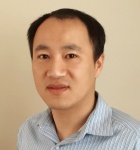Rutgers, The State University of New Jersey
Assistant Professor
Department of Chemical and Biomolecular Engineering
Advancing microbial co-culture engineering with biosensing techniques
Utilization of rationally designed and engineered microbial co-culture has emerged as a robust approach for biosynthesis of various products ranging from simple commodity chemicals to complex pharmaceuticals. In this approach, a biosynthesis pathway is divided into separate modules, each of which is accommodated in a specialized microbial strain for desired bioconversion. The co-cultivation of these strains presents a streamlined process leading from the pathway substrate to intermediate and product. One of the main challenges of co-culture engineering is dynamic regulation of the co-existence and collaboration of the co-culture members during co-culture cultivation for bioproduction optimization. To this end, we adapted metabolite biosensing techniques to facilitate the control of cellular activities of the co-culture strains to rationalize their biosynthesis behaviors. Specifically, we explore the use of selected biosensors to regulate co-culture growth and biosynthesis behaviors according to the concentration change of biosynthesis pathways’ substrate, intermediate and product, respectively. As a proof of concept, biosensors were integrated into E. coli-E. coli co-cultures for improving the biosynthesis performance of three valuable biochemicals, 2-hydroxybenzoate, hydroxystyrene and pinocembrin. Our results show that the integrated co-culture systems produced the target products at titers significantly higher than the co-cultures without biosensors. Interestingly, the integration of the biosensors into the mono-culture controls did not show the same level of biosynthesis improvement, indicating that microbial co-cultures are a more flexible platform for integration with biosensing to serve the need of biosynthesis. The findings of this work add a new dimension to microbial biosynthesis and promote the synergistic development of co-culture engineering and biosensing.
Bio
Dr. Zhang is a chemical engineer by training. He received his bachelor and master degrees in chemical engineering from Xiamen University. Later on, he entered Dr. Blaine Pfeifer’s group at Tufts University and completed PhD study in bioengineering in 2011. He then joined the chemical engineering department at MIT and worked as postdoctoral associate in the metabolic engineering laboratory. Currently, Dr. Zhang is an assistant professor of the chemical and biochemical engineering department of Rutgers University. His research interests include metabolic engineering, synthetic biology, natural product, and applied microbiology. In particular, his group studies microbial co-culture engineering and biosensing techniques. So far, he has published 36 research articles and reviews in academical journals with more than 1500 citations. He also serves as a reviewer for 26 scientific journals in the field of bioengineering.
Thursday, May 21, 2020
- Time: 10:00 AM
- Location [virtual]: WEBEX Link
- Seminar Flyer

Assistant Professor
Rutgers, The State University of New Jersey